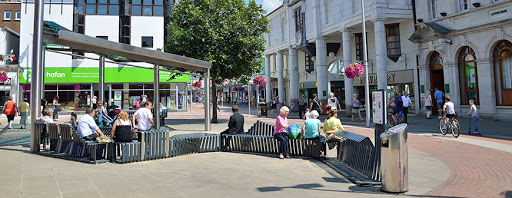There are two themes that have been prevalent in defining the history of the town of Llanelly (later changed to Llanelli): religion and industry. This article will examine the rich history that Wales has with Christianity and the events in Wales that enabled first Catholicism and then Protestantism to become the dominant faith. The churches in Llanelli play an active role in the communities that they are in. Christmas, Easter and Jesus Christ are all subjects that people in Llanelli know only too well; this is because the education system in Llanelli and Wales encourages pupils to pursue Christianity. Christianity, however, was not founded and developed in Wales, so how did the people of Llanelli adopt Christianity and its culture? The fact is that the Welsh people lost their independence first to the Romans and then to the Normans who colonised Wales and enforced their culture and beliefs on us.
When looking at different empires throughout history the language, religion and culture of the colonising nation dominates the culture that of the colonised people. This is the reason that English is the dominant language throughout the United Kingdom, North America and even Australia. Wales was the first colony that England took possession of and as a result the Welsh language is not the most dominant language in Wales.
Not many people in Llanelli would think that William the Conqueror had influenced how Llanelli was founded. However, when he conquered England and took the English throne at the battle of Hastings in 1066, he charged his barons (who viewed themselves as soldiers of Christ) with colonising Wales and spreading Christianity throughout our small nation. Norman Bishops were also tasked with eradicating the names of Welsh Saints and replacing them with Norman ones.
The Romans left traces of its empire in Loughor (Llanelli did not exist at this time). The Normans left more evidence of their occupation of Wales than the Romans. As a show of military strength the Normans built castles to infiltrate and conquer the surrounding areas. This was certainly the case with Kidwelly Castle; the castle was used to settle Anglo-Normans so that they could transform the surrounding area to replicate an Anglo-Norman society.
Llanelli today is the largest and most populace town in Carmarthenshire this, however, has not always been the case. In fact in the year 1556 Llanelli had a population of only twelve households and was being governed by the lords of Kidwelly. The Norman Nobility lived in the safety of Kidwelly Castle and were essentially foreign invaders to the Welsh people.
This brings us to the foundation of Llanelli: Llan translated into English means church, therefore, Llanelli translates to Church of Elli. There are numerous towns and villages in Wales that begin with Llan. This is further evidence of the dominance of Christianity throughout Wales. The Parish Church in Llanelli is dedicated to St Ellie. It is believed that the church was founded on a spot where St Ellie prayed in the sixth century. It is thought that St Ellie was the daughter or granddaughter of Brychan Bryncheinog who ruled over Kingdom of Brecknock. The story of St Ellie, however, has a tragic end because she was faced with a forced married to a prince. Although, instead she chose to end her own life and she became a martyr in the process. If indeed she did have noble blood it would have helped her achieve enough recognition at the time of her death to enter into a sainthood. It is highly unlikely that if a farmer’s daughter at the same time that St Ellie lived had done the same thing and took her own life, then she would not be remembered in the history books. Another interesting theory is that St Ellie is believed to be the cousin of another Saint who is more famous today: St David the patron Saint of Wales.
There were many factors that led to the foundation and growth of Llanelli. This article has focused on the events that led to Christianity being adopted as the religion of choice in Wales and subsequently impacting the lives of all the future generation of people who lived Llanelli
Llanelli was not a significant town in South Wales until the industrial revolution which saw the rise of many industries in the town and a significant growth in the population. It is the rise of industry that I will be focusing on in next month’s Llanelli Standard history column.
Help keep news FREE for our readers
Supporting your local community newspaper/online news outlet is crucial now more than ever. If you believe in independent journalism, then consider making a valuable contribution by making a one-time or monthly donation. We operate in rural areas where providing unbiased news can be challenging. Read More About Supporting The West Wales Chronicle





















